O guitarrista finlandês Timo Tolkki dispensa apresentações. Fundador do Stratovarius e compositor de clássicos absolutos como “Black Diamond”, “Against the Wind” e “Speed of Light”, o músico está de passagem comprada para o Brasil, onde tocará hits de sua ex-banda em São Paulo no dia 24 de abril.
Conversei com Timo Tolkki por mais de 1 hora e falamos sobre vários assuntos: Andre Matos, Symfonia, 25 anos do “Visions”, mercado da música e os problemas recentes envolvendo a banda de apoio que o acompanhará no Brasil.
Vamos começar falando sobre essa turnê “Stratovarius Classics”? Como surgiu essa ideia?
Timo Tolkki: Em 2019, um promoter da Colômbia chegou com essa ideia. Ele fez vários shows do Stratovarius por lá. Ele estava fazendo uma turnê com o HammerFall lá e ele me explicou a ideia. Depois, começou a marcar esse formato em outros lugares. Me considero um artista solo a partir de então.
Nessa época, estava saindo de uma depressão de quase dois anos. Não conseguia compor nada, mas depois começou a fluir. Foi aí que compus o novo álbum ‘Return to Eden’, do Avalon. Foi bem nessa hora que ele veio com essa ideia dos clássicos do Stratovarius.
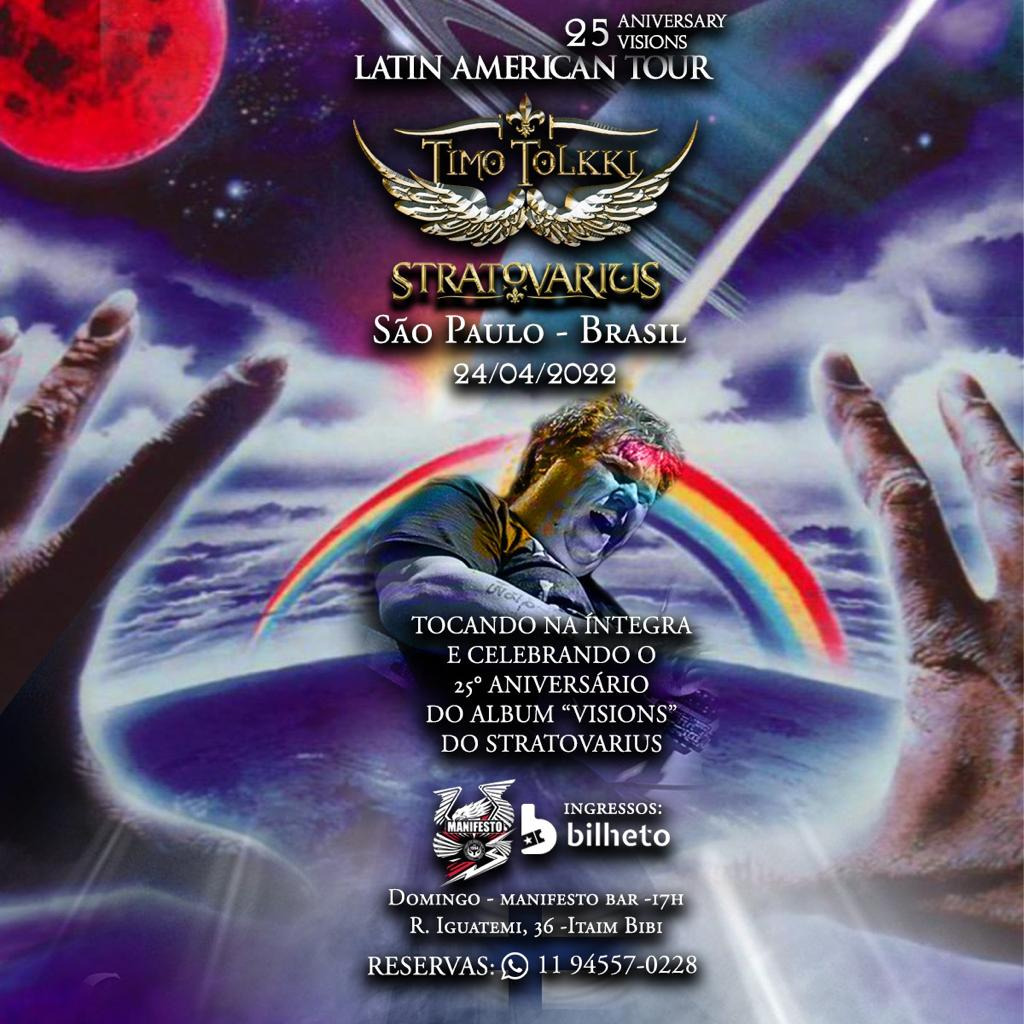
Como está sendo a experiência de tocar os clássicos do Stratovarius? Por que a banda inteira não virá ao Brasil? Isso acabou culminando nessa história em que o vocalista Guilherme Hirose disse que ficou chateado com você por causa da questão do cachê...
Timo Tolkki: A resposta do público está sendo ótima! Toco dessa forma, com músicos locais em diversos lugares. As pessoas amam isso! Me parece algo legal de se fazer. Toquei 23 shows no México com bandas locais. Isso é bastante! Ninguém fez isso no México antes. Agora, em 2 anos nesse esquema, nunca havia tido problemas. Foi a primeira vez que isso aconteceu.
Agora, por que não posso ir com minha banda titular? Bom, nós tentamos! Mas não deu certo. Não sei se as pessoas no Brasil não estavam interessadas em minha música, mas não sei o que houve. Não sei dizer. Depois, eu mesmo contatei a casa de show Manifesto, em São Paulo, e perguntei se rolava tocar lá. A princípio, eles toparam.
Não fazia ideia de quem eram os caras dessa banda que me acompanharia. Não sei da cena atual, sou um cara antiquado. Só escuto as mesmas coisas sempre. Não tem jeito. De qualquer forma, era uma banda local e sempre os promoters locais que pagam essas bandas. Aí o vocalista me disse que eles não eram só mais uma banda. Eu prometi que pagaria US$ 500, mas depois fiz os cálculos. Tem meu voo, hotel, voo de volta e tudo mais. Quantas pessoas iriam ao show? Qual o valor do ingresso? Percebi que não dava para pagar.
Ele ficou muito ofendido com isso. Se você olhar a conversa de WhatsApp que tive com ele, fui bastante educado. Agora, quando falo ‘Toca de graça ou se manda’, não foi correto de minha parte. Eu me desculpo por isso. Mas fiquei chateado, sabe? É apenas mais um show e virou uma história longa. Eu entendo ele não querer tocar de graça e respeito isso. Nesse caso, eu precisaria procurar outra banda. Quando expliquei isso, o vocalista me disse que os caras não eram bons o suficiente para mim. Depois, o vocalista disse que o Manifesto iria cobrir o cachê.
Por mim, estava ótimo. Essa era a ideia original. Tudo estava legal, mas aí vi esse vídeo com uma entrevista dele falando mal de mim. Depois, descobri que o Manifesto não ia pagar eles. Ou seja, eles mentiram para mim. O baixista e o baterista disseram que não era verdade. Estou no meio de uma bagunça aqui. Não tinha que ser assim. Estamos esquecendo que o propósito aqui é tocar música.
Nunca desrespeitei as habilidades deles enquanto músicos. Em certo ponto na conversa do WhatsApp, comparei eles com minha banda original, formada pelo Alessandro Conti e o Jari Kainulainen. Só disse que nossas carreiras foram mais para frente do que as deles. Não tem nada a ver com habilidades. A comunicação teve um ruído aí, que levou a desentendimentos. Não sou assim, sabe? Aí vi esse corte da entrevista dele em que ele fala sobre mim. Esse trecho estava com 12 mil visualizações e 250 comentários. O programa inteiro, que era sobre a música dele, tinha 1 mil reproduções. Algo estava errado aí!
Nos comentários, estavam dizendo mentiras sobre mim. Dizendo que quando toquei na Colômbia, eu teria dito para minha equipe sabotar o som da minha banda de apoio. Isso é mentira! Nunca faria nada disso. Nem faço passagem de som. Meu roadie é quem faz. Não é quem eu sou. É ao contrário, porque sempre ajudei muitas bandas na minha carreira.
Eu analiso seus contratos, se gosto da banda, encaminho demos para a Nuclear Blast ou Frontiers, porque conheço os caras. Então fico me perguntando por que isso tudo está acontecendo?
Eu preciso pagar minhas contas. A Finlândia é um dos países mais caros na Europa. Para viver lá não é barato. Vivo em um pequeno apartamento de 65 metros quadrados e dois quartos. Pago de aluguel € 850. Se for adicionar aí o aquecimento, luz elétrica e comida, dá para viver com uns R$ 10 mil. O preço é complicado. Ou seja, preciso de todo dinheiro que conseguir.
Normalmente, não pago pelos meus voos. Os promoters que pagam. Mas dessa vez, queria muito tocar no Brasil. Vou para Buenos Aires também pagando do meu bolso. Acredito que as pessoas que estarão lá são meus fãs. Essa é a história do que aconteceu.
Você acha que essa tensão pode prejudicar o show em São Paulo? Como está o sentimento em relação a essa apresentação?
Timo Tolkki: A primeira coisa que faço quando percebo um conflito é tentar encontrar uma solução diplomática. É assim que sou. Odeio brigar. Essa história foi longe demais. Tipo, teve 12 mil views em 4 dias! Meu novo clipe teve a mesma coisa! Agora, quando for tocar em São Paulo, será em uma atmosfera positiva, com meus fãs, que vieram ver minha música. Não toco lá desde o Symfonia, onze anos atrás. Amo o Brasil e o Rio de Janeiro! É minha cidade preferida no mundo! Amo a praia e tenho muitos amigos lá.
Li muito sobre o Brasil e visitei muitos lugares aí depois que saí do Stratovarius. Eu estive com meu grande amigo Gus Monsanto, de Petrópolis. Fomos em umas catorze cidades. Fui para Belém, Amazônia e tudo mais. Toquei com bandas locais, com o Marcelo Moreira na bateria. Vi o Brasil inteiro! Depois, estudei um pouco da história. Sei que os europeus chegaram séculos atrás e tinham 11 milhões de habitantes originais aí. Agora, são 250 mil. Sei da pobreza no Brasil. Sei que muitos vivem com o equivalente a poucos dólares por dia.
Na América Latina existe essa realidade. Olhando a história, vejo que começou nessa chegada dos europeus. É uma situação financeira complicada. Agora, no meu caso, é apenas um show pequeno em um bar. Quanto mais rápido resolver isso, melhor. Não vale a pena esquentar tanto a cabeça. Vamos resolver os problemas. Por que acha que temos tantos problemas no mundo? Não consigo nem fazer meu show sem problemas!
Vamos falar sobre coisas legais agora! Você disse que tem uma boa relação com o Brasil. No seu último álbum “The Enigma Birth”, do Avalon, temos dois brasileiros: os vocalistas Marina La Torraca e Raphael Mendes. O que pode dizer dessa colaboração?
Timo Tolkki: Na verdade, esse projeto não esteve muito em minhas mãos. Foi ideia da gravadora Frontiers. Eu basicamente compus umas doze músicas. Eles que contataram os cantores. Nunca me encontrei com os dois brasileiros que cantaram. Não conhecia o trabalho deles. Você sabe, sou um cara que ouve as mesmas coisas sempre. Eu ouço Coldplay e U2. Amo música de forma geral, é tudo parte da humanidade. Não precisamos dividir. Amo ABBA, Deep Purple e Rainbow. Gosto de música pop finlandesa também.
Falando sobre Avalon, a música com mais reproduções no Spotify é “Enshrined in My Memory”, com participação de Elize Ryd, do Amaranthe. Como foi gravar essa música e trabalhar com ela?
Timo Tolkki: Fui para a Suécia gravar essa música! Queria conhecer as pessoas que gravariam, sentir a energia. Ela cantou umas quatro músicas nesse álbum. Ela tem muita energia gigantesca! É uma cantora fantástica. Todos nós concordamos que esse primeiro disco “The Land of New Hope” é o melhor.
Depois, a Frontiers quis que a coisa se transformasse em uma espécie de Avantasia, mas isso é algo muito particular do Tobias Sammet. Todos que tentarem copiar vão falhar. Existem vários Metal Opera, mas ele fez isso primeiro. A Frontiers quis isso, fazer dinheiro com essa Avalon Metal Opera. Nunca encarei isso dessa forma e nem uso esse termo. Os dois primeiros discos apresentam uma história conectando as músicas, mas depois isso não aconteceu mais. Nos últimos discos do Avalon, perdi o controle. Tudo está com a Frontiers.
Voltando a falar sobre sua relação com o Brasil, precisamos falar sobre o Symfonia e Andre Matos. Quais memórias você tem da gravação do álbum “In Paradisum”? Você acha que a banda não teve o reconhecimento que merecia?
Timo Tolkki: Acho que não teve o reconhecimento que merecia. Todos nós sentimos isso. Trabalhamos duro nesse álbum, demos umas 300 entrevistas. Aí entramos em turnê e ninguém comparecia. Nos shows, o Andre não queria tocar nenhuma música do Stratovarius que fosse da época do Timo Kotipelto. Ele dizia não faria isso por respeito a ele. Não entendi muito bem, já que as músicas eram minhas. Acho que ele não quis mesmo.
Conheço o Andre Matos desde 1996 acho. Conheci ele em Atenas, na época do Angra. Ele era tão legal. Lembro que ele precisava dar uma entrevista, mas estava cansado. Aí ele falou que qualquer coisa era só tomar um Guaraná que ficava acordado. O que diabos é Guaraná? Sei lá! Mas ele falou isso.
Depois, nos encontramos por seis semanas na nossa turnê do “Destiny”. Foi pela Europa toda, vivendo em um ônibus. Não tem nada de rockstar! Você dorme no ônibus quase sempre. Foi estranho, porque o Andre ficava sempre no nosso ônibus. Quando eu acordava de manhã, lá estava ele dormindo no lounge. Eu via que ele ficava mais com a gente porque tinha alguns problemas entre ele e o Angra. Ele não falava muito sobre isso, mas por que ele não estaria dormindo com eles?
Eles estavam na época do “Fireworks”. Lembro que tocaram em Paris para 6 mil pessoas. O Bruce Dickinson participou do show! Eles tocaram “Flight of Icarus”. Foi maravilhoso! Eu estava lá, assistindo de perto do palco.
Anos depois, alguém me contou que o Andre agora vivia na Suécia. Pensei: ‘Legal, bem perto!’. Decidi ligar e trocar ideia. Ele disse que tinha um filho com uma sueca. Disse que é bem diferente do Brasil. Eu concordei! Ele vivia em uma cidade pequena de 1 mil habitantes. Convidei ele para me visitar em Helsinque e decidimos que eu escreveria umas músicas. Enviei umas demos para ele depois. Uma gravadora se interessou, então percebi que o Jari Kainulainen e o Uli Kusch viviam na Noruega e o Mikko Härkin em Helnsinque. Todos estavam no mesmo continente, então por que não formar uma banda? Foi assim que começou. Foi um acidente, sabe? Todos viviam a 1 hora de avião. Você pode chamar de “supergrupo”, mas nunca pensamos assim.
Nós não fizemos um segundo disco, porque isso dependia da resposta quanto ao primeiro disco. Acho que ninguém se interessou porque já era a época em que esse estilo de música estava entrando em declínio de certa forma. As pessoas se interessavam menos. Tocamos no Uruguai, Chile e tudo mais. O Andre marcou os shows no Brasil. Aí quando chegamos no aeroporto, ele disse que o show havia sido cancelado. Obrigado, Andre! Se você tivesse me dito isso antes, seria melhor! (risos).
Pensei em simplesmente chamar os fãs e tocar um pouco, mas não funcionou muito bem. Era para tocarmos no Carioca Club, mas acabamos em um bar perto. O Andre ficou bêbado demais e quase caiu quando subiu no palco. Eu falei que ele não devia tocar lá, não era digno do calibre dele. O Andre era um cara especial. Aprendi muito com ele. Ficamos muito próximos.
Uma história engraçada sobre essa experiência foi a gravação da voz do Andre Matos. Nos encontramos num frio de lascar, no topo das montanhas, a internet era péssima. Era um lugar que você via animais selvagens! Isso era janeiro, no meio do inverno. Fui visitar o Andre na cidade dele, aí pegamos o carro Volvo dele e pensei: ‘Andre, você sabe dirigir nessa neve? Você é de São Paulo!’. É perigoso! Ele disse que estava tranquilo. No final, deu tudo certo.
Aí quando começaríamos a gravar a voz, ele falou: “Timo, foi mal, mas não pensei nas letras ainda”. Bom, então precisávamos escrever! Sabe o que ele fez? Ele sentou e começou na hora a escrever as letras. Pegou um papel e simplesmente escreveu. Eu disse que estava legal. Depois, foi para o microfone e cantor. Aí foi para a próxima. Pena que não tenho mais esses manuscritos!
Só que na primeira música que ele foi gravar para valer, ele parecia o Lemmy do Motörhead de tão rouco! Perguntei o que tinha acontecido. Bom, o Ano Novo tinha acabado de acontecer e ele foi comemorar. Ele me disse que no Brasil tem uma tradição de pular sete ondinhas, né? Só que lá era uma água congelada de inverno! Ele pegou uma gripe danada. Eu disse que, com todo respeito, não dava para gravar! Fomos ao médico e ele levou umas injeções nas cordas vocais. Só assim ele conseguiu gravar! Foi uma aventura e tanto!
Depois dessa turnê com o Symfonia, você manteve o contato com ele? Como soube de sua morte?
Timo Tolkki: Nos últimos anos, perdemos o contato. Ele continuou seu trabalho indo e voltando entre Brasil e Suécia, pelo que eu saiba. Eu estava em uma entrevista ao vivo quando alguém me contou sobre sua morte. Fiquei chocado! Depois disso, chorei por dois dias inteiros. Ninguém esperava por isso. Acho que, de alguma forma, sendo ele o artista com o calibre e genialidade que tem, sua morte foi como um retorno para sua casa. Tenho uma espiritualidade e acho que era a hora dele. O legado dele vive e estamos protegendo esse legado. Isso vale a pena.
Lembro que na época do Symfonia, tocamos a música “Lasting Child”, do Angra. Ele me mostrou os acordes que tinha composto. Fiquei tipo: ‘Que porra é essa!?’. Não sabia fazer aquilo! Precisei escrever para entender. Tinha notas no chão para eu compreender. É uma composição clássica, sabe? Ele começou esse estilo. Ele tem essa perspectiva matemática da música que eu não tenho. Eu consigo ler música, mas sou um cara mais do feeling. Ele era as duas coisas! Foi quando ele me mostrou essa música que percebi sua genialidade. Toda vez que ouço essa música, fico sentimental, porque isso me lembra dessa época. Sou grato de poder conhecer ele. Pena que ele não esteja mais conosco.
Qual sua música favorita do Angra?
Timo Tolkki: Acho que “Carry On”. Na época, estava no Japão promovendo meu álbum e nunca tinha ouvido o Angra. Quando ouvi, vi que o cantor era fenomenal. A banda era ótima. Agora, nessa música, não gosto da parte que entram uns trompetes, contei isso para ele! Não entendi bem, mas ok, acho que deve estar lá.
Outra música que gostou muito é a “Stand Away”, que o Rafael Bittencourt escreveu. É algo clássico e mágico. Eles viraram estrelas no Japão! Conseguiram o Disco de Ouro lá! Lembro que na época de ouro do Stratovarius encontrei o Angra lá no Japão e enquanto nós nos divertíamos, o Rafael e o Kiko Loureiro ficavam tocando guitarra toda hora! Eles ficavam lá praticando e todo mundo bebendo. A dedicação deles é grande.

Mudando de assunto para o Stratovarius, esse ano o álbum “Visions” faz 25 anos! Quais memórias você tem dessa época? Quando você estava compondo, já percebeu que seria um clássico?
Timo Tolkki: Quando percebi o caminho que o Stratovarius estava tomando depois do “Dreamspace”, infelizmente percebi que não dava para continuar com os membros anteriores, como o baterista Tuomo Lassila. Eles não conseguiam tocar, não eram habilidosos o suficiente. Lembro de tocar “Speed of Light” e “Father Time” para o baixista Jari Kainulainen no backstage e ele ficou tipo: “O que é isso? Caramba”. Certamente era bem diferente do que fazíamos antes.
Depois, encontrei o baterista Jörg Michael em uma turnê. Ele estava com o Headhunter, da Alemanha. Percebi na hora que ele era muito bom, um showman! Primeira coisa que pensei foi em ligar para ele depois dessa turnê. Perguntei se ele queria tocar na minha banda e ele perguntou: “Qual banda?” (risos). Eu expliquei sobre o Stratovarius! Eu tinha umas demos do “Episode”, como “Father Time” e “Speed of Light”. Ele ouviu e gostou! Eu tive um instinto de que aquilo seria o melhor.
O próximo passo era conseguir um tecladista e isso foi uma história engraçada! Coloquei um anúncio dizendo: “Procuramos um tecladista que toque como o Jens Johansson”. Depois, pensei: “Por que não perguntar ao próprio Jens se ele topa?”. Peguei o número dele de fax. A primeira coisa que ele falou foi que o nome “Stratovarius” estava escrito errado! Ele sempre brincou comigo com isso, porque é um piadista. Ele pediu para enviar umas demos. Ele vivia em Manhattan, Nova York. Enviei a mesma demo e ele disse que era bem legal. Nos encontramos em Helsinque, ensaiamos um dia e percebemos que tudo fluiu fácil. Foi assim que começou.
Após a turnê do “Episode” na Europa e Japão, comentei com os caras que iria começar a trabalhar no próximo, que seria o “Visions”. Nessa altura, o Jörg me alertou para uma coisa que não tinha percebido. Ele me disse que eu compus o “Visions” inteiro em um dia e meio. Foram dez músicas! Isso é possível quando você está muito inspirado. Escrevo minhas músicas relativamente rápido. Tipo vinte minutos no máximo. Se levar mais que isso, deixo de lado e continuo no dia seguinte.
Tipo, a “Black Diamond” veio em 15 minutos. “Season of Change” também. Não sei, mas posso estar conectado a uma força do universo que me envia as músicas. Bom, na época do “Visions”, certamente sentimos que algo mágico estava acontecendo.
Foi nessa época que visitamos o Brasil pela primeira vez. Fomos em Recife e o Andre estava lá também! Chegamos na praia e não tinha palco nenhum lá. Não entendi nada, mas o Andre disse que eles estavam construindo o palco na hora! Nós íamos subir no palco tipo umas 23h e acabou que subimos às 4h da manhã! Não me esqueço disso. Tocamos “Wil the Sun Rise?” e o sol estava literalmente nascendo! Eu vi o sol nascendo!
Depois, fomos para praia estávamos de boas, até percebermos que tinham placas dizendo “Cuidado com os tubarões”. Ninguém disse isso para a gente! O hotel era pertinho e era um festival. Os caras falaram que ia atrasar e era para nós voltarmos para nossos quartos. No final, só tocamos 4h da manhã! Sabe, não tínhamos ideia do sucesso do Stratovarius no Brasil! Nós viemos da Europa, da Finlândia, para um paraíso! Tinha milhares de pessoas cantando nossas músicas! Que porra era aquela! Não fazíamos ideia!
Tem algum álbum do Stratovarius que você acha que teve menos atenção do que merecia?
Timo Tolkki: Acho que a história do Stratovarius foi como uma evolução. Começou com “Fright Night”, que é um disco horrível. Foi feito em 3 dias! Depois, veio uma crescente até o “Elements” e depois pra mim veio um lixo. O “Elements” amo muito. Agora, o “Visions” foi quando decolamos. Percebemos que estávamos no auge. Você precisa entender que do “Dreamspace” para o “Episode” só passaram dois anos. Já do “Twilight Time” para o “Episode”, foram quatro anos. Foi algo muito rápido. Uma evolução rápida. Sempre um álbum e logo depois uma turnê.
Fomos ficando maiores e maiores. Para onde mais poderíamos ir? Aí chega o ponto em que você faz a curva e desce. Depois, começa tudo de novo. Sabe, nunca compus música para os fãs. Como artista, preciso satisfazer a mim mesmo primeiro. Se alguém ama o que faço, é a melhor coisa que pode acontecer. Nos shows, sempre toco o que os fãs querem ouvir. Não me importo a quantidade de fãs, mas é verdade!
Percebo um declínio da indústria da música. No final, teremos só Britney Spears e essas coisas. Os fãs de metal continuam apoiando os artistas. Tudo tem a ver com o dinheiro. Eu preciso ser um artista criativo, mas preciso pagar o aluguel! Somos uma raça em extinção. Essa situação nos força a agir. Comecei a ver no Spotify que músicas como “Black Diamond” chegaram a mais de 25 milhões de reproduções. Isso é muito, mas não reflete em dinheiro.
Ao invés de reclamar, pensei em achar uma solução. Pensei de maneira pragmática: por que não fazer meu próprio Spotify? Pensei nisso, seria algo criptografado. Você pode comprar minha música. Será algo benéfico. Isso deve sair em setembro. Vou convidar outros artistas e pagaremos 70% dos lucros para eles. É assim que deve ser. Como os criadores do conteúdo podem ter a fatia menor do bolo? Não entendo isso. Algo está muito errado no sistema.
Qual sua relação com o pessoal do Stratovarius hoje em dia? Curte os últimos álbuns?
Timo Tolkki: É uma relação boa! Somos amigos, falo com o Jens, Lauri Porra, Matias Kupiainen. O único cara que ainda é um pouco complicado é o Timo Kotipelto, mas ele tem bons motivos para ficar com o pé atrás. Falei muitas coisas ruins sobre ele. Quando deixei o Stratovarius, foi algo complicado. Foi difícil deixar a banda para trás. Eu dei o nome para eles, mas fiquei com raiva disso. Não faz sentido, né? Mas foi assim que aconteceu. Eu ouvi algumas coisas recentes. O álbum “Polaris” é muito bom. Adoro a música “Unbreakable” também, falei isso para o Matias quando encontrei ele uma vez.
Não temos razão para dividir o Stratovarius entre o antigo e o novo. Tudo é a mesma coisa. A mensagem precisa ser única. Os fãs precisam estar unidos. Estamos bem. O Timo vem de uma parte da Finlândia em que as pessoas são meio teimosas! Já me desculpei com ele cara a cara uns dois anos atrás. Ele me convidou para assistir ao show deles em Helsinque. Lembro que as pessoas na plateia ficavam me olhando tipo: “Você é quem estou pensando que é?”. E eu tipo: “Sim, sou eu”.
Fui visitar eles no backstage e não os via já tinha 10 anos. Foi um momento especial para todos. Eu agradeci porque eles tocaram “4000 Rainy Nights” e amo essa música. Falei que o Timo cantou muito bem. Foi nessa ocasião que falei que sentia muito pelo que aconteceu e pelo que disse. Eu agradeci por ele cantar minhas músicas. Ele agradeceu por eu deixar que eles tocassem. Foi um encontro lindo, tiramos até uma foto que teve 1 milhão de likes no Facebook! É como uma família, só faltou o Jari!
Os fãs podem esperar uma reunião do Stratovarius como foi a do Helloween?
Timo Tolkki: Bom, os fãs esperam muitas coisas. O que o Helloween fez foi algo bem legal. Sabe, o Stratovarius tem sua própria carreira agora. Eles progrediram e foram para uma direção diferente, o que é correto. Não ficaram só copiando as coisas antigas. Desejo sinceramente poder fazer uma última turnê com eles, mas seria legal ter todos os outros caras que deixaram a banda também.
Não sou eu quem decide isso, todos precisam concordar. O tempo vai dizer. Sei que eles vão lançar um álbum novo ano que vem acho. Eu também farei um disco novo esse ano. Então acho que isso não deve acontecer pelos próximos 3 anos, mas não dá para saber.
O que você achou dessa reunião do Helloween? Curtiu o álbum novo?
Timo Tolkki: Acho que eles queriam muito fazer isso e todos queriam ver. Eu amo muito o Michael Kiske. Ele é um ET! Mas sabe, quando ouço o novo disco, achei estranha a produção. Faria diferente, mas as músicas são legais. Gostei muito da “Skyfall”, que é do Kai Hansen. Essa música mostra muita criatividade e talento. Sabe como eles decidiram voltar? Foi um festival em que o Unisonic e o Helloween tocaram juntos. Aí o Michael Weikath e o Kiske ficaram frente a frente. O Weikath disse: “O que fiz de tão errado que você não pode me perdoar?”. Então o Kiske perdoou e tudo mais. Foi um acidente e deu tudo certo. Todos estavam felizes.
Fico feliz de ter o Kiske em algumas músicas da minha carreira solo. Nós trabalhamos juntos no Metal Opera também, do Avantasia. Eu era a “Voz na Torre”. O Tobias pediu para eu fazer essa tal dessa voz. Para mim, isso foi uma piada! (risos). Eles colocaram uns efeitos e ficou uma voz grave! Depois, toquei uns dois solos para outras músicas. Também produzi o “Vain Glory Opera”, do Edguy.
Obrigado pela entrevista, Timo Tolkki! Quer deixar uma mensagem final?
Timo Tolkki: Obrigado você! Sabe, quero aproveitar a oportunidade para dizer que deu uma entrevista no México um tempo atrás e eu estava bêbado. Falei várias coisas estúpidas. Eu tomei umas pílulas para dormir e depois me deram tequila. Eu falei que inventei o nome Sonata Arctica. Isso é mentira! (risos). Acho que xinguei a Tarja também, mas me desculpa por isso. Preciso me desculpar com ela. Conheço os caras do Nightwish já tem 30 anos! Eles estavam na grade na turnê do “Episode”! Lembro de ver o Emppu, Tuomas e Tarja lá!”
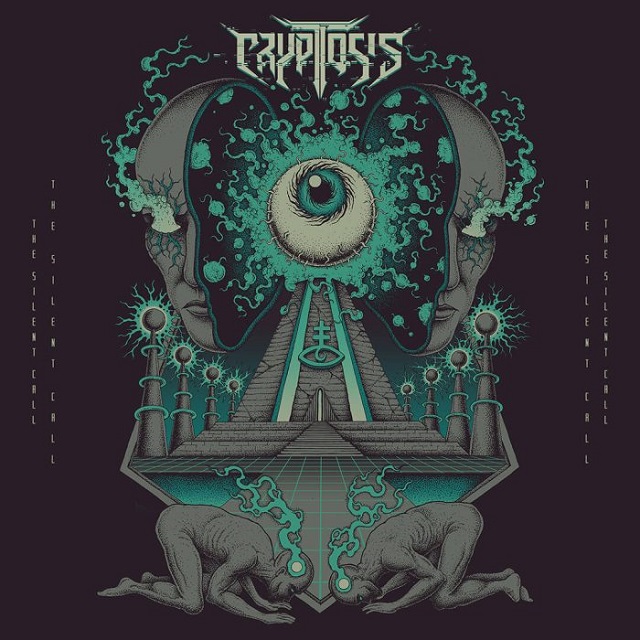



 Angus Young, do AC/DC, no Power Trip. Créditos: Reprodução/Facebook/Power Trip
Angus Young, do AC/DC, no Power Trip. Créditos: Reprodução/Facebook/Power Trip


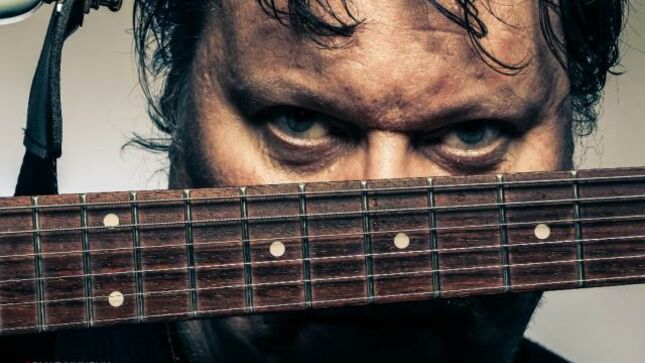 Former STRATOVARIUS Guitarist TIMO TOLKKI Announces Plans To Remove His Music From All Streaming Platforms - "To Me, Spotify Represents An Entity That Is Solely Based On Corporate Greed"
Former STRATOVARIUS Guitarist TIMO TOLKKI Announces Plans To Remove His Music From All Streaming Platforms - "To Me, Spotify Represents An Entity That Is Solely Based On Corporate Greed"
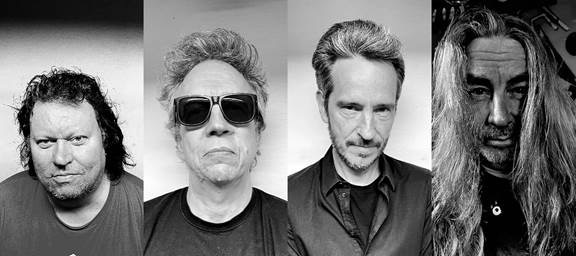



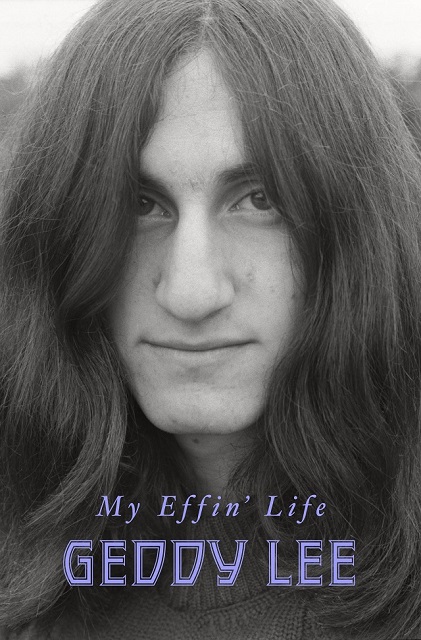


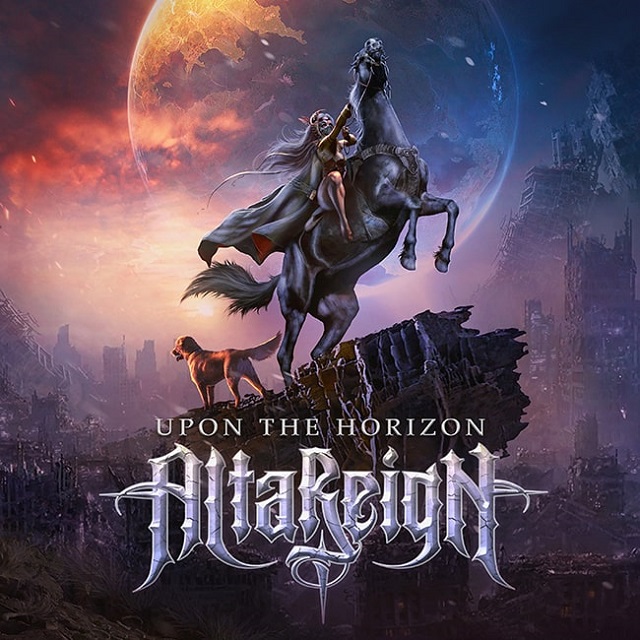

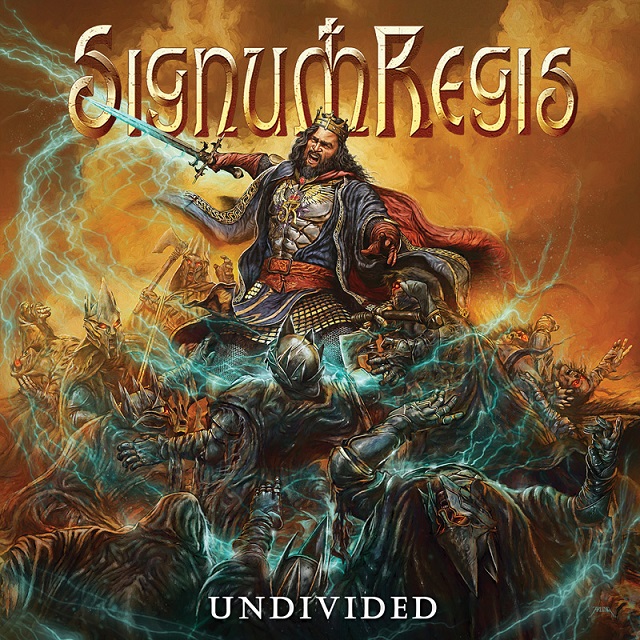
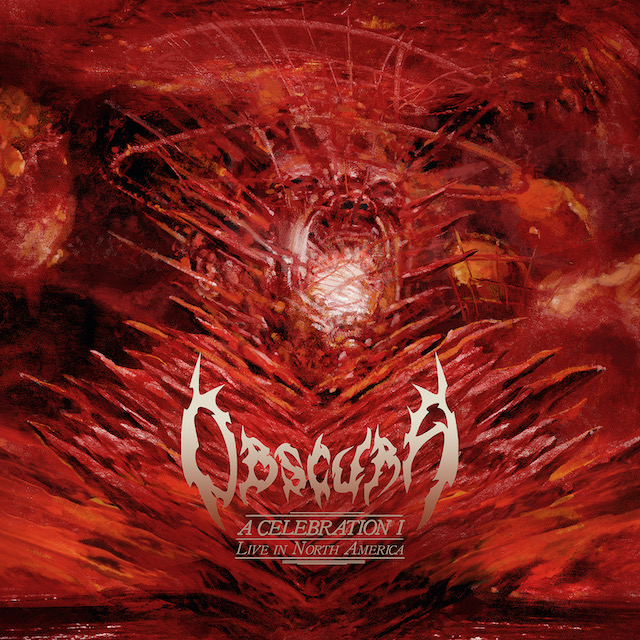
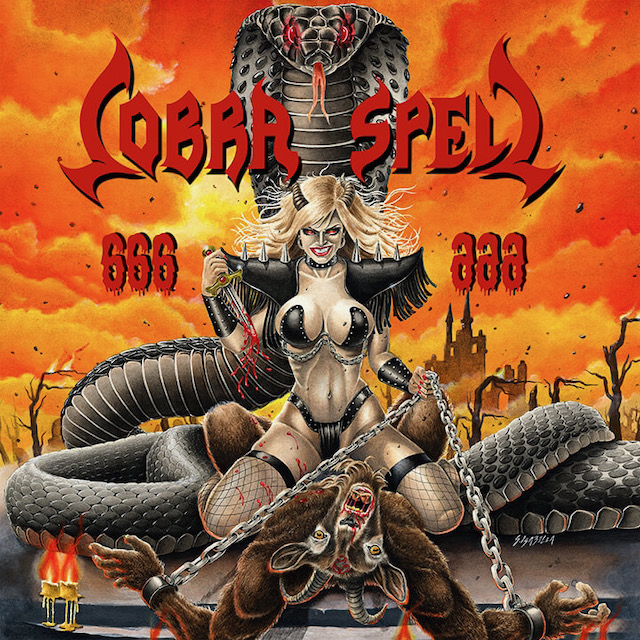

.jpeg)
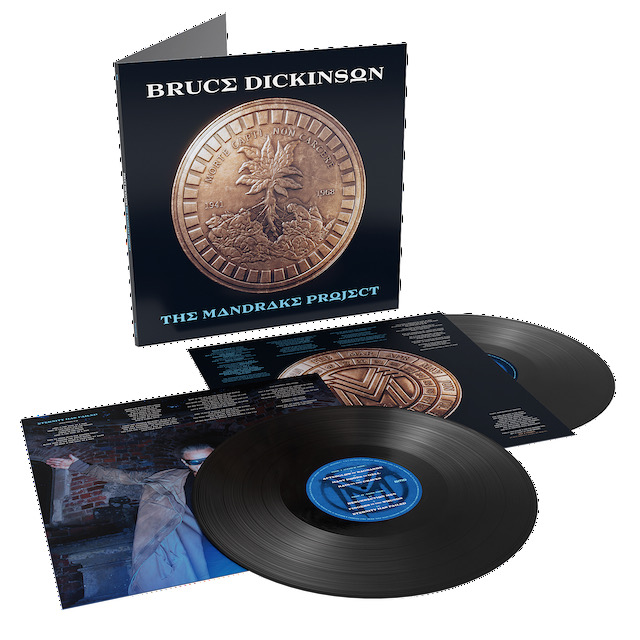
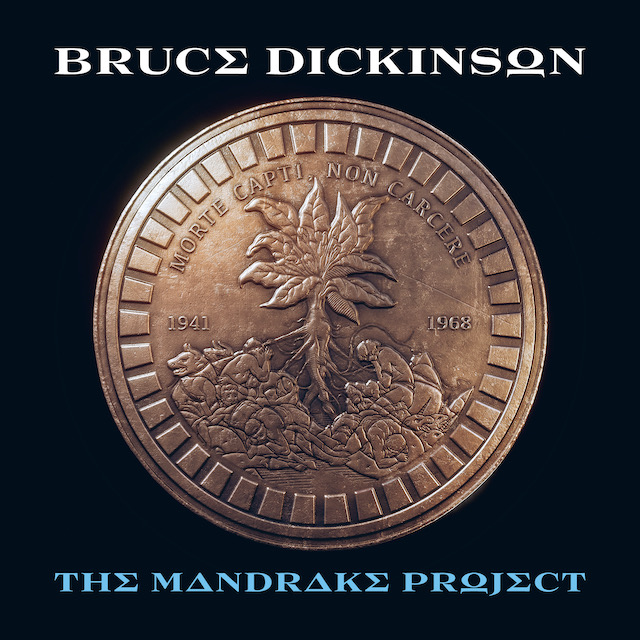

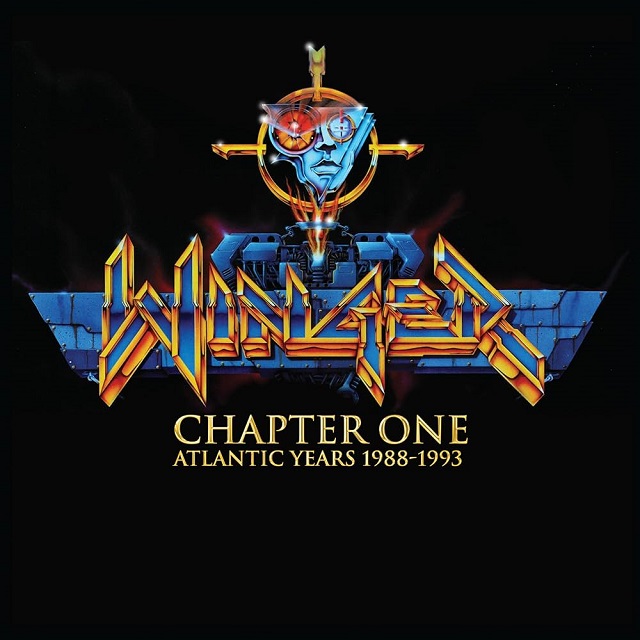
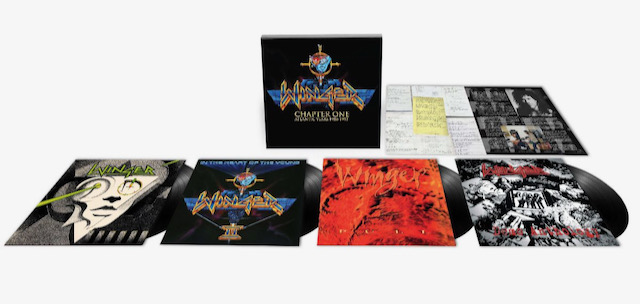
 Slash. Crédito: Reprodução/Facebook
Slash. Crédito: Reprodução/Facebook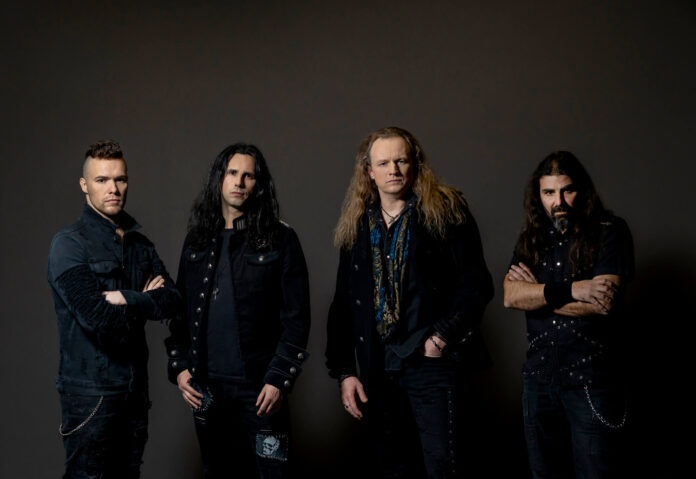
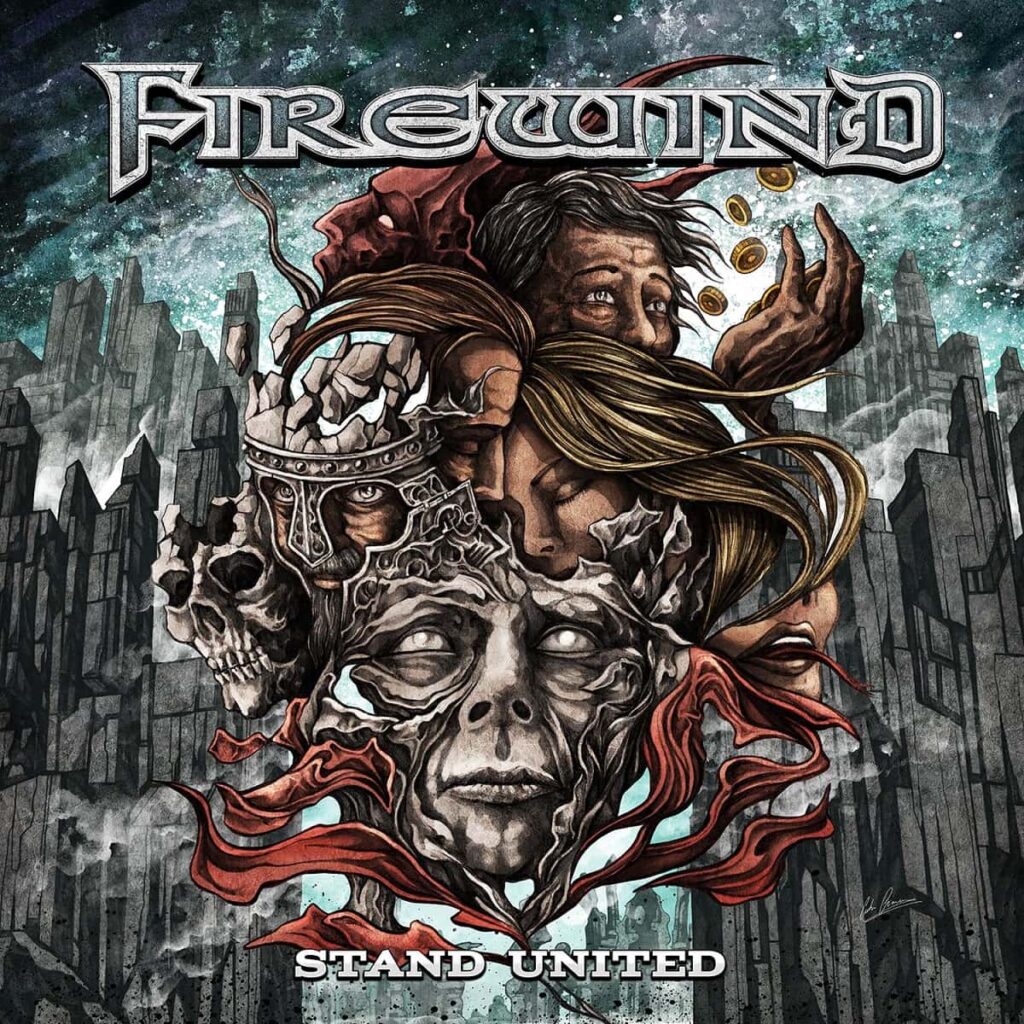 Firewind: mais um single está disponível
Firewind: mais um single está disponível
 Erik Grönwall faz cover do Black Sabbath. Confira! / Reprodução / Acervo WEB
Erik Grönwall faz cover do Black Sabbath. Confira! / Reprodução / Acervo WEB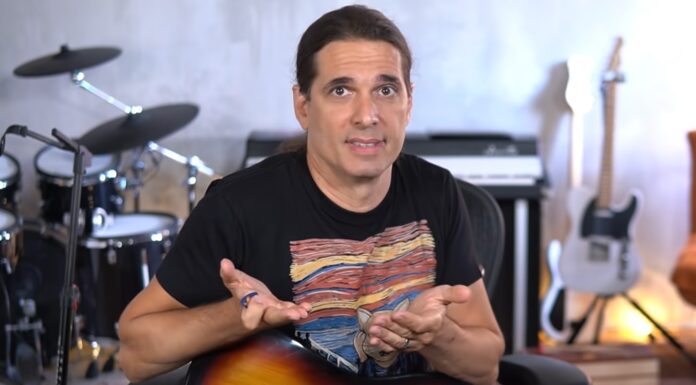


 Biff Byford do Saxon. Crédito: Leca Suzuki
Biff Byford do Saxon. Crédito: Leca Suzuki